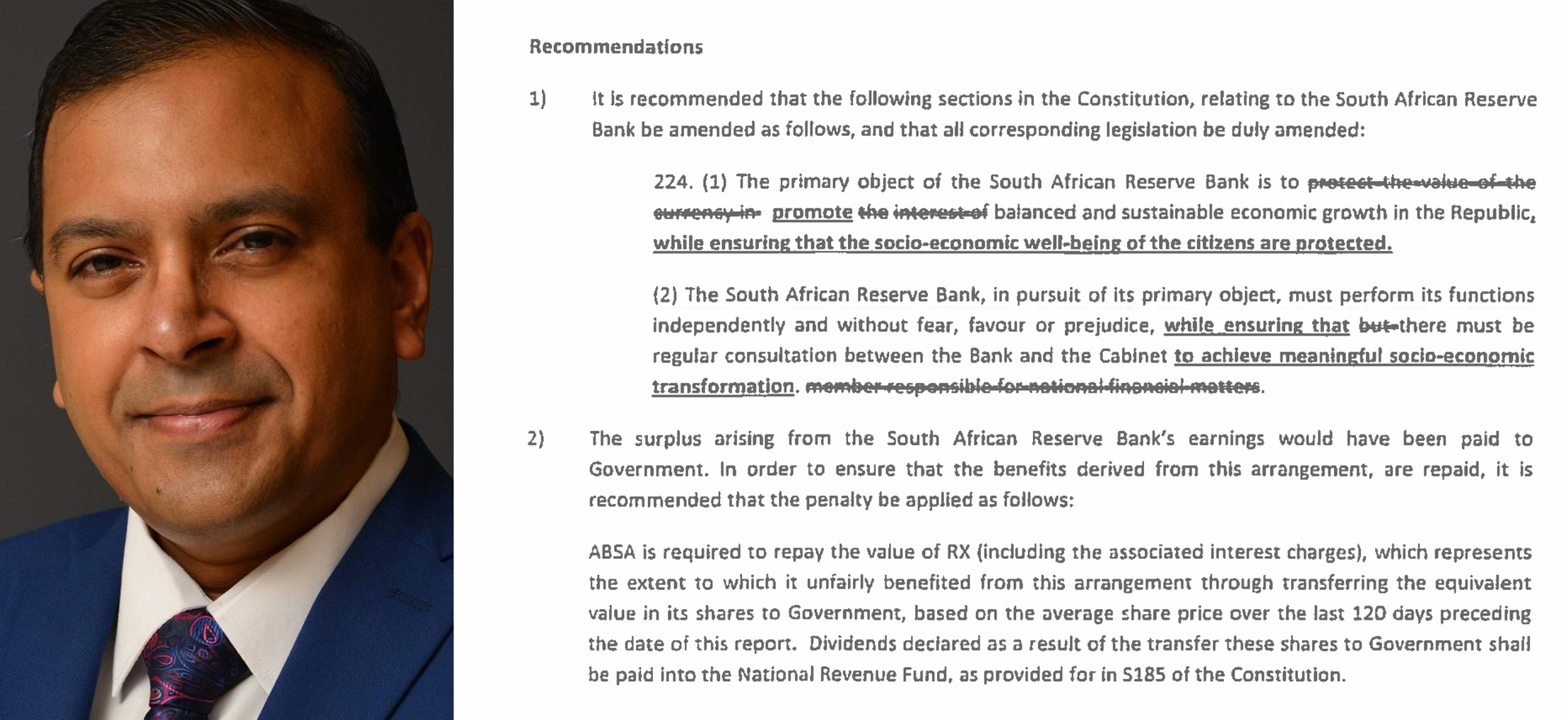Public Protector Busisiwe Mkhwebane’s controversial June 2017 order directing Parliament to amend the Constitution to change the mandate of the South African Reserve Bank was handed to her on a piece of paper by a State Security Agency (SSA) official, an affidavit seen by News24 and amaBhungane states.
The wording of the SSA recommendation, which included exactly how the Constitution should be amended, found its way verbatim into Mkhwebane’s final report, dubbed the CIEX report. This raises new questions about her relationship with the spy agency.
It also raises questions over the conduct of senior SSA officials and their involvement in a clandestine scheme to nationalise the SARB under the cloak of a report by the public protector.
Mkhwebane’s report emerged at the height of the Zuma administration’s attempts to bring to heel institutions holding out against state capture, notably the national treasury and the SARB.
Her report was billed by a senior SARB official as a “brazen attack” on the independence of the central bank, and received swift backlash and condemnation.
She was roundly criticised in successive court judgments that set aside the report, and was ordered to pay some of the legal costs out of her own pocket over her lack of candour and transparency.
The Constitutional Court found Mkhwebane had acted “in bad faith and in a grossly unreasonable manner”.
Now, a shock affidavit has revealed the true extent of Mkhwebane’s improper and apparently dishonest conduct – not only in the CIEX/SARB matter, but also in her investigation of the Gupta-linked Vrede dairy farm scandal (see State Capture 2.0, Part Two to follow).
The Estina report too was set aside by the courts, where she was again criticised for a lack of honesty.
The affidavit was deposed under the Protected Disclosures Act by a public protector staff member whose identity is known to News24 and amaBhungane.
The detailed allegations it sets out undercut Mkhwebane’s campaign to portray herself as the victim of a political plot. Instead, it details how she allegedly took steps to withhold evidence from the courts, which implicated herself.
The whistleblower’s affidavit was sent to National Assembly Speaker Thandi Modise and to President Cyril Ramaphosa’s office on Friday, 13 December 2019.
Mkhwebane dismissed the whistleblower’s allegations as “baseless claims and ramblings of disgruntled current and former employees”.
Some of these employees, she said, were facing disciplinary action.
“The intention is clear: to influence the mooted parliamentary process to remove me from office. I will respond substantively in due course.”
Notes to a conspiracy
According to the whistleblower’s affidavit, the SSA instruction was handed to Mkhwebane and her senior investigator assigned to the CIEX complaint, Tebogo Kekana, at a meeting on 6 June 2017 by SSA official Maiendra “Mai” Moodley (see photo bellow) – just weeks before the final report was released.

News24 and amaBhungane discovered Moodley’s typed note earlier this year in papers the public protector’s office disclosed during the court review of her CIEX report, but it was not identified as an SSA document, so its significance was unclear until the whistleblower’s account emerged.
Moodley was seconded to the SSA from the State Information Technology Agency under then SSA Director-General Arthur Fraser. The affidavit states that Mkhwebane introduced Moodley as an “economist”, however his expertise lies in computer systems.
The June 2017 meeting was the second Mkhwebane held with SSA officials about the CIEX report.
She met with then state security minister David Mahlobo, Fraser and a senior SSA agent named James Ramabulana on 3 May 2017. Ramabulana was also present at the 6 June meeting.
The whistleblower states that Mkhwebane, contrary to the office of public protector’s standard practice, instructed her lead investigator, Kekana, not to record or take notes during this meeting.
The whistleblower also alleges that Mkhwebane held a private discussion with Mahlobo prior to the official meeting, which was “odd”.
Mahlobo would not comment on the issues raised, while Fraser referred queries to the SSA, which confirmed it would provide comment, but had not done so at the time of writing.
Moodley did not respond, while a query for Ramabulana, sent to the SSA, also went unanswered.
Perjury?
The Constitutional Court earlier this year upheld a personal costs order against Mkhwebane by the Gauteng High Court in Pretoria related to the SARB’s review of her CIEX report. In its majority judgment, the apex court criticised Mkhwebane’s lack of honesty.
On Thursday, 12 December, Mkhwebane described the personal costs order as a “low point” of her year during a press briefing, although she said she found solace in the minority judgment penned by Chief Justice Mogoeng Mogoeng, which ascribed her conduct to innocent errors.
At the heart of the court’s concerns was Mkhwebane’s failure to disclose meetings with the SSA and the presidency in her CIEX report – and the patchy disclosure and contradictory explanations she subsequently offered in court proceedings.
The differing versions Mkhwebane put forward during litigation resulted in the original CIEX complainant, Paul Hoffman, filing a charge of perjury against the public protector with the police.
The Organisation Undoing Tax Abuse also filed a second, more detailed charge.
News24 and amaBhungane understand that Mkhwebane has been asked to provide a warning statement to the Directorate for Priority Crime Investigation, or the Hawks, relating to these complaints.
Now, the whistleblower affidavit alleges that Mkhwebane deliberately withheld documents from court – providing evidence that will strengthen those charges and which tend to confirm the Constitutional Court majority judgment that she was dishonest.
Succession of lawyers
When SARB took Mkhwebane’s CIEX report on judicial review, she was obliged by a court rule, known as Rule 53, to disclose every document and piece of evidence relied on during her investigation.
The Constitutional Court was scathing about her failure in this regard, noting:
“The Public Protector is wrong when she claims that she ‘filed the entire record’. She did not.
“She omitted pertinent documents from the record, some of which were only put up for the first time as annexes to her answering affidavit in the High Court, and others, which were disclosed for the first time in this Court.”
Now the whistleblower exposes some of the intrigue behind that failure.
The whistleblower alleges Mkhwebane was adamant that she did not wish to have everything included in the record – at least twice she instructed her investigator, Kekana, to withhold specific documents.
When Kekana relayed this message to the public protector’s then lawyers, they insisted all relevant documents had to be included and disclosed.
“Advocate Mkhwebane vehemently opposed this,” the whistleblower claims, noting that the first set of lawyers were thereafter replaced.
The whistleblower discloses an example, an email to Kekana from Mkhwebane stating that she had “asked SSA to provide input and economist”.
That email was omitted from the Rule 53 record and has never been disclosed until now. The whistleblower claims that Kekana also disclosed to Mkhwebane’s new counsel, Adv McCaps Motimele, the fact that aspects of the recommendations in the report were prepared for the public protector by the SSA itself and not by her.
Motimele, too, was eventually replaced as counsel on the matter.
When the matter was before court, a different advocate had to be hired at the last minute. DM
Reporting by Kyle Cowan, Sam Sole and Sarah Evans.

The amaBhungane Centre for Investigative Journalism, an independent non-profit, co-produced this story. Like it? Be an amaB Supporter to help us do more. Sign up for our newsletter to get more.


















 Become an Insider
Become an Insider